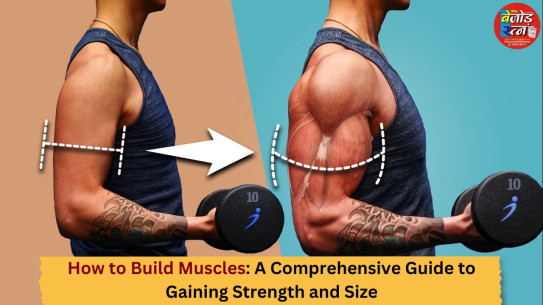- How to Build Muscles: A Comprehensive Guide to Gaining Strength and Size

How to build muscles: Building muscle is a goal shared by many, from fitness enthusiasts to professional athletes. Understanding how to build muscles effectively can transform your physique, boost your strength, and improve your overall health. This comprehensive guide will walk you through the essential steps to achieve muscle growth, from diet and exercise to recovery and consistency. By focusing on the keyword "how to build muscles," this article will provide detailed information to help you reach your fitness goals.
Understanding Muscle Growth
The Basics of Muscle Hypertrophy
Muscle hypertrophy refers to the increase in muscle size. This process occurs when muscle fibers sustain damage or injury from strenuous activity. The body repairs damaged fibers by fusing them, which increases the mass and size of the muscles. To understand how to build muscles, it's crucial to grasp the basics of muscle hypertrophy and the factors that influence it.
Factors Influencing Muscle Growth
- Resistance Training: Engaging in weightlifting or resistance training is vital for muscle growth. These exercises cause micro-tears in muscle fibers, prompting the body to repair and strengthen them.
- Nutrition: Proper nutrition provides the necessary fuel and building blocks for muscle repair and growth. Protein, in particular, plays a critical role in muscle development.
- Recovery: Muscles grow during periods of rest, not while exercising. Ensuring adequate sleep and rest days is essential for muscle recovery and growth.
- Consistency: Regularly following a well-structured workout and nutrition plan is key to sustained muscle growth.
Designing an Effective Workout Plan
Compound vs. Isolation Exercises
When learning how to build muscles, it's important to understand the difference between compound and isolation exercises. Compound exercises, like squats and deadlifts, engage multiple muscle groups simultaneously, leading to more significant overall muscle growth. Isolation exercises, like bicep curls and leg extensions, target specific muscles and are useful for addressing muscle imbalances.
Creating a Balanced Routine
A balanced workout routine should include exercises targeting all major muscle groups. Here's a sample weekly routine:
-
Monday - Chest and Triceps:
- Bench Press
- Incline Dumbbell Press
- Tricep Dips
- Tricep Pushdowns
-
Tuesday - Back and Biceps:
- Pull-Ups
- Bent-Over Rows
- Barbell Curls
- Hammer Curls
-
Wednesday - Rest Day
-
Thursday - Legs and Shoulders:
- Squats
- Leg Press
- Shoulder Press
- Lateral Raises
-
Friday - Full Body:
- Deadlifts
- Lunges
- Push-Ups
- Planks
-
Saturday and Sunday - Rest Days
Progressive Overload
Progressive overload is a fundamental principle in muscle building. It involves gradually increasing the weight, frequency, or number of repetitions in your strength training routine. This continuous challenge encourages muscle adaptation and growth.
Nutrition for Muscle Growth
Importance of Protein
Protein is essential for muscle repair and growth. Consuming an adequate amount of protein ensures that your body has the necessary amino acids to build and repair muscle tissue. Aim for a protein intake of about 1.2 to 2.2 grams per kilogram of body weight per day, depending on your activity level and muscle-building goals.
Macronutrient Balance
While protein is crucial, balancing your intake of carbohydrates and fats is also important. Carbohydrates provide the energy needed for intense workouts, while healthy fats support hormone production and overall health.
Meal Timing
Eating the right nutrients at the right times can enhance muscle growth. Consuming a protein-rich meal or snack within two hours post-workout can help maximize muscle repair and growth. Additionally, spreading protein intake evenly throughout the day can be more effective than consuming large amounts in a single meal.
Supplements for Muscle Building
Whey Protein
Whey protein is a popular supplement among those learning how to build muscles. It provides a convenient source of high-quality protein that can help meet daily protein needs.
Creatine
Creatine is a well-researched supplement that can enhance strength, muscle mass, and exercise performance. It works by increasing the availability of ATP, the primary energy source for muscle contractions.
Branched-Chain Amino Acids (BCAAs)
BCAAs, including leucine, isoleucine, and valine, are essential amino acids that play a significant role in muscle protein synthesis. Supplementing with BCAAs can reduce muscle soreness and support recovery.
Importance of Recovery
Sleep
Adequate sleep is crucial for muscle recovery and growth. During deep sleep, the body releases growth hormone, which aids in tissue repair and muscle development. Aim for 7-9 hours of quality sleep per night.
Active Recovery
Incorporating active recovery days, such as light walking or yoga, can help reduce muscle soreness and improve circulation without adding additional strain to your muscles.
Hydration
Staying hydrated is essential for overall health and muscle function. Dehydration can impair muscle recovery and performance. Aim to drink at least 8-10 cups of water per day, more if you're engaging in intense physical activity.
Consistency and Patience
Building muscle is a gradual process that requires consistency and patience. Stick to your workout and nutrition plan, track your progress, and make adjustments as needed. Celebrate small victories along the way and stay committed to your long-term goals.
Conclusion
Understanding how to build muscles involves a combination of effective resistance training, proper nutrition, adequate recovery, and consistent effort. By following the principles outlined in this guide, you can embark on a successful muscle-building journey. Remember, everyone's body responds differently, so it's important to find what works best for you and stay dedicated to your fitness goals. Whether you're a beginner or an experienced athlete, the path to muscle growth is within your reach.
Comments About This News :
खबरें और भी हैं...!

- 2025-11-20 21:39:29
वीडियो
देश
इंफ़ोग्राफ़िक
दुनिया
Tag
HONDA4D
KUAT4D | Megamind Computer Institute Azamgarh Kursus & Sertifikasi IT Berorientasi Karier Tepercaya.
AROMA4D
HONDA4D
VENUS4D
BALAP4D
BALAP4D
CERDAS4D
Hotel4D | Layanan Hukum Aligarh oleh Prashant Mittal Pidana, Keluarga, Perusahaan & Konsultasi Plus.
ENAK4D
etscorns.com
HONDA4D
BERSIH4D
CERDAS4D
AROMA4D
HOTEL4D
HOTEL4D
HOTEL4D
MUSIK4D
ENAK4D
ENAK4D
VENUS4D
BERSIH4D
AROMA4D
KUAT4D
KUAT4D
https://aeriumsinarmasland.com/
https://anakbangsaeducation.com/
https://andrewwenn.com/
https://aoms.co.id/
https://ayomcoffee.id/
https://bangunciptamandiri.com/
https://bathtubindo.com/
https://blue-gen.com/
https://bssrecruits.co.id/
https://byrustudio.com/
https://carltonskinandwellness.com.au/
https://dris.co.id/
https://energiprimerasia.com/
https://gowebbagus.id/
https://gumindonesia.com/
https://hfgold-astoria.com/
https://hsp85.com/
https://idnglobal.id/
https://ikpimedan.com/
https://japanfitness.co.id/
https://jasaskripsijakarta.com/
https://jcacademy.id/
https://joindong.id/
https://kursipijat.com/
https://lambangbarata.com/
https://lightministry.id/
https://lightministryorchestra.com/
https://lspahlikontrakkonstruksi.com/
https://manggalakarya.com/
https://multistruktur.com/
https://nug.co.id/
https://pinestree.id/
HONDA4D
https://pt-asp.co.id/
https://pudipes.com/
https://worldwidetargeting.com/
https://vipbestnews.com/
https://resta.co.id/
https://samarajayasejahtera.com/
https://sawasdeejastip.com/
https://serasy.id/
https://shiawaselestari.com/
https://shiseijapan.com/
https://tatacipta.com/
https://tepungnusantara.id/
https://tigamultipilar.com/
https://tokobathtub.com/
https://transbahteralogistik.com/
https://ultimatenutritionofficial.com/
https://vrbconsultant.com/
https://zephyrpowdercoating.com/
https://zonaqustudio.com/
ENAK4D # Link Situs Slot Gacor Kasi Bukti Bukan janji!!
HOTEL4D
MUSIK4D
HONDA4D
https://anakbangsaeducation.com/home-10/
https://scap.sas.org.sg/contact/
https://www.olevelnotes.com/model-paper/model-paper-m1-r5-1/
https://megamindci.com/verification.php?id=Enrollment%20No
https://megamindci.com/course.php?cid=5&course=Certificate%20Courses
https://thenewshind.com/
https://lightministry.id/light-ministry-love-and-care/
https://scap.sas.org.sg/code-of-ethics/
https://newsmailtoday.com/?p=80657
HONDA4D
SLOT ZEUS
SLOT DANA
SLOT QRIS
AGEN SLOT
LINK ZEUS
LINK DEMO
SLOT JEPANG
SLOT KAMBOJA
LINK MAHJONG
VENUS4D
https://wijanglibrary.smkn6solo.sch.id/
https://smkn6solo.sch.id/
SITUS LINK GACOR
HONDA4D
HONDA4D
VENUS4D
VENUS4D
CERDAS4D
HONDA4D
https://fantechnews.com/
https://friesiannews.com/
https://globalguidenews.com/
https://maruyamadrill.com/
https://newsinrus.net/
https://pemerintahnews.com/
https://pitchmynews.com/
https://techytimenews.com/
https://theminingnews.org/
https://titikkriminal.com/
https://vipbestnews.com/
https://vipbusinessnews.com/
https://worldwidetargeting.com/
https://www.thewisdomtreeacademy.in/contact-us.php
MUSIK4D
















